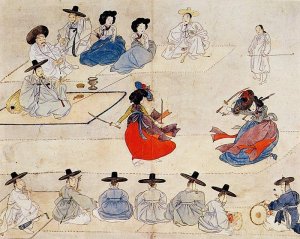Chuno is an odd show. It’s gorgeous to look at, if overly self-conscious, full of odd camera angles, exotic fight choreography, half-naked hunks and stylized slow-mo. However, all the pretty is in the service of a story that is essentially an extended chase scene. Jang Hyuk dazzles as Dae-Gil, owning the screen with sly humor and feral intensity. The role itself though is rather underwritten, and in the hands of a lesser actor could easily have become an inscrutable cipher. Speaking of ciphers, the principal antagonist looks fabulous massacring his way across Korea, but there is little sense of internal conflict or even compelling motivation as he instantly transforms from dutiful son to unstoppable killing machine. The female characters are also problematic. Lee Da Hae spends much of the show radiating pristine helplessness, more a walking stereotype of unattainable love than a human being, while Kim Ha Eun starts out spunky and clever, but devolves into obsessed and clingy.
Thematically, there are some interesting ideas thrown around about slavery, class, progress and authority but the writer seems unsure of exactly what he wants to say about them. The show is built around the awfulness of slavery, but it also depicts most of its slave characters as gullible fools, reinforcing the negative stereotypes stamped on them by the powerful. Folks respond to injustice with violence and/or flight, but neither tactic really seems to get anyone anywhere. There is a lot of stunning footage of running and fighting, but little clear sense of how the audience should feel about these choices. Are we supposed to applaud them? Reject them? Realize that the situation is a hopeless mess? And what is a viewer supposed to conclude from the fact that when change does happen, it results from factors almost totally removed from the actions of the central characters?
Good acting and striking visuals keep Chuno entertaining, but the narrative muddle weighs it down. There are some powerful moments, but the script never matches the dangerous, high-flying verve of its knife-wielding leading man.
Was this review helpful to you?

























